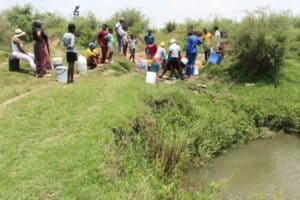Limpopo premier admits failure in addressing water shortage since 2013, promising action on long-standing challenges.

Limpopo premier Stanley Mathabatha has acknowledged his administration has failed to address the shortage of water in his area since he took over in 2013.
Mathabatha was speaking during his last meeting of the Limpopo executive council (exco) at The Ranch Hotel, outside Polokwane, yesterday.
ALSO READ: ‘Sabotage, vandalism’ disrupt Giyani water project
He will remain the premier until 12 June, when a new legislature and premier are inaugurated. He said during the recent exco meeting, members approved cluster reports that highlighted the progress made in various sectors, laying a solid foundation for the incoming seventh administration.
He said exco acknowledged the dedication and hard work of all departments and officials.
Addressing challenges
“However, we recognise that there are outstanding matters, such as the issues related to water provision and projects that have stalled for several years. It is our collective responsibility to address these challenges,” he said.
The Citizen can reveal that several areas have been plagued by water shortages in the regions of Waterberg, Vhembe, Sekhukhune, Capricorn and Mopani. Sekhukhune and Mopani have always been the hardest-hit by drought.
The Flag Boshielo and De Hoop Dams have been instrumental in providing bulk water to Polokwane, Jane Furse, Marble Hall, Groblersdal and Burgersfort.
Mopani’s challenges became serious after the region was declared a disaster area in 2008, leaving two main water sources, Middle Letaba and Nsami, dams dry.
The situation became serious, resulting in residents competing for dirty water with wild animals in fountains and rivers. The only waste water treatment plant in the town was old, spilling sewage into the Giyani River.
This gave rise to an outbreak of cholera and typhoid, killing people and animals. In 2014, former president Jacob Zuma instructed the then water and sanitation minister, Nomvula Mokonyane, to turn the water situation of the area around.
ALSO READ: Polokwane passes R6 billion budget but ‘where is the money going’?
About R500 million was allocated for the Giyani Bulk Water project. The project included taking of water from the usually full Nandoni dam to Nsami dam in Giyani.
The work was expected to be completed in three years. But since then, residents of the 55 intended villages in Giyani are yet to receive water from their taps.
The budget for the project has since ballooned to R4.5 billion and the deadline has also been extended to 10 years. As a result, some residents have threatened to boycott the upcoming general election.
Speaking as if he was signing off for good from office, Mathabatha said: “I am filled with pride at the progress we made under our leadership.”








